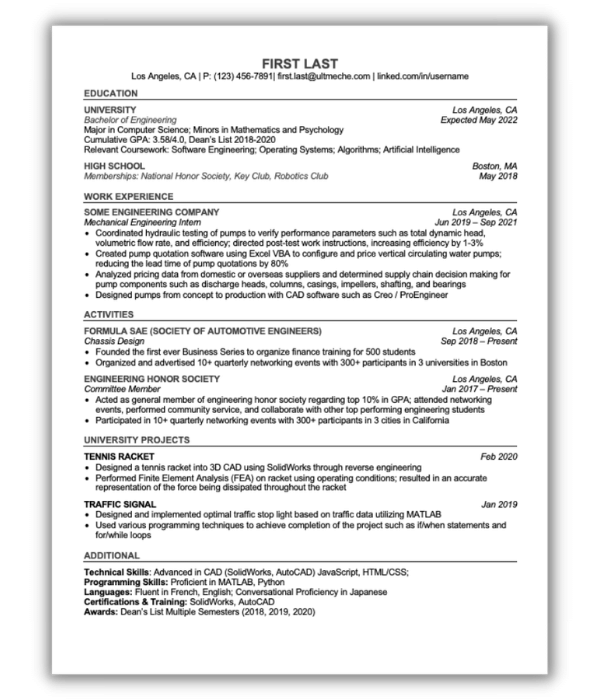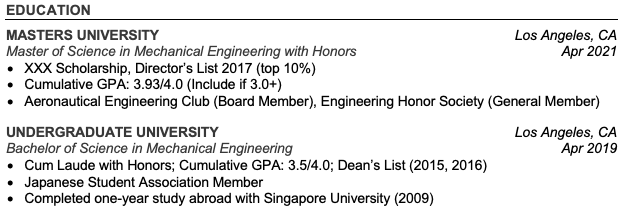If you want to get a good job, here are 7 things to put on resume with no work experience. You’re going to need as much ammo as you possibly can get to land you your first role. Especially without work experience.
These are going to be 7 things to put on resume with no work experience.
March 2, 2024Projects
Projects are a great way to showcase your technical skills that are relevant to the role you’re applying to.
Whether it be engineering, finance, business, or physical work such as electrical, HVAC, or plumbing – you will need a portfolio of projects.
Make sure to specify projects on your resume.
Include the following underneath the projects section of your resume:
- Project Name
- Where the project was done
- Dates of the project
- Responsibilities and duties of the projects
- Keywords
- Quantitative results and accomplish regarding the project
The most important part is that you specify keywords pertaining to skills along with metrics that showcase your business impact regarding projects on your resume.
This is the number one effective method to use when you don’t have work experience, but want to demonstrate that you have some experience.
Projects will be showcased in a section titled “Project Experience” in your resume.

See the above example for the best resume format where there is a section for “University Projects”, A.K.A “Project Experience”.
Underneath those projects will be specific skillsets that are related to the engineering industry.
Activities
Activities will consist of volunteering, clubs, university projects, memberships, and organizations that are relevant to your industry and the job that you’re looking for.
Examples of memberships that you can put on your resume are:
- Honor Societies
- Clubs – Robotics, Rocket Building, Space
- Business associations
- Volunteering at any institution or organization
- High School / College Memberships
- Finance Clubs
- Accounting Clubs
- Nursing Societies
- Ethnic Group Societies
There are hundreds of societies and organizations out there to join.
We highly recommend joining one or a few that are relevant to your industry. You’ll build a network, make some friends, and find opportunities that you wouldn’t elsewhere.
Technical Skills
Next, you will want to make sure that you have technical skills to put on your resume.
Technical skills will consist of software such as Microsoft Office, Adobe Photoshop, Quickbooks, CAD software, Analysis software.
Technical skills will also consist of those such as calculation methods – discounted cash flow, tolerance stack up, quarterly financials, financial modeling, data structures and algorithms, etc.
You’re going to look to include any and as many technical skills as possible. As a result of doing this, your chances of getting the job interview will increase because you have implemented key words that the recruiter or hiring manager is looking for regarding their candidates.
Technical Skills will belong in the “Additional” section of your resume.
Certifications
Along with projects and technical skills, you’re going to need to capture certifications on your resume.
Certifications are a way to give you more authority as a job seeking candidate. They will show that you have the skill and that your possession of the skill is backed by an intuition.
If your industry has licensing opportunities, we highly recommend you pursue them.
Some examples of practical certifications and licenses you can get in the job industry are:
- Project Management Professional
- Professional Engineer
- Certified Public Accountant
- Agile / Scrum / Lean Training
- 6S Green Belt / Black Belt Training
- Coding Bootcamps
These are all certificates that will be backed by legit institutions in the respective industry that you’re in.
As a result, companies will be more confident to take you on in interviews and potentially hire you as a candidate.
Certifications and Training go in the “Additional” section of your resume.
Awards
Specifying awards on your resume will be a great way to show your accomplishments.
Examples of awards on your resume include:
- Scholarships
- Competitions relevant to your industry
- Employee spot awards
- Awards that are achieved in school
- Dean’s List / Honor Roll Awards
The above are all certifications that will reflect very positively on a candidate that is looking for jobs, but does not have that much experience yet.
Awards can go in the “Additional” section of your resume.
The Additional Section on Your Resume (Example)
The Additional Section of your resume will contain the majority of the information. It will be filled with a lot of good information if you don’t have work experience on your resume.

You’ll see we specify the following underneath the additional section of the resume:
- Technical Skills
- Languages
- Certifications & Training
- Awards
Education
Education will be important to specify if you do not have experience on your resume.
If your industry does not require education, we suggest you do not include it.
But for industries in which four year university degrees are required, we recommend placing an education section.
The education section of your resume should consist of:
- University Name
- University Location
- Degree Title
- Years of education
- Relevant highlights and awards – scholarships, dean’s lists, high GPA, etc.

Closing Thoughts on A Resume with No Work Experience
Although it can be intimidating to look for a job when you have no experience, there are plenty of ways to write a solid resume.
Making sure that you have the information in these sections will make up for lack of experience:
- Projects
- Activities
- Technical Skills
- Awards
- Certifications
Recruiters and hiring managers will understand that for entry level roles and internships, people will not have experience.
However, it is still imperative that you at least have a one page resume that is filled with the above.
Filled meaning that you don’t leave too many blank spaces.
FAQ
To get a job with no experience, we highly recommend that you focus on everything else besides work experience. Projects, education, awards, certifications, and skills must be highlighted to make up for the lack of work experience. This will be the things that the recruiter and hiring manager will want to know
You should specify a “Projects” section on your resume if you are lacking work experience. If you are not lacking work experience, just simply placing your work experience along with your job duties, responsibilities, results, and accomplishments will suffice.
Some things to put on your resume are – projects, education, awards, certifications, and technical skills
About the author

Kazuyoshi Fujimoto, PE
Founder | Engineering Career Coach | Principal Mechanical Engineer
Kazu oversees all of ultmeche’s engineering services. He provides consulting such as resume reviews, rewrites, mock interviews, and all services career related. Additionally, Kazu performs consulting work regarding Oil & Gas, Automotive, and Aerospace & Defense. Kazu is licensed as a professional engineer in the state of California and has 9+ years of experience in Oil & Gas, Automotive, and Aerospace & Defense.
